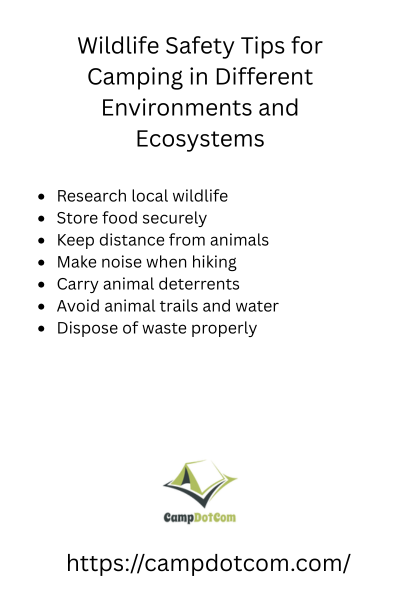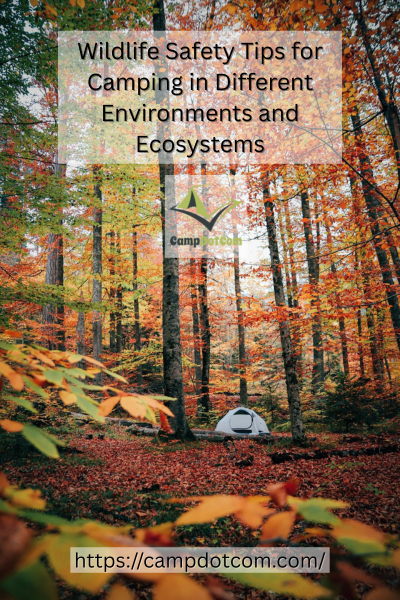If you’ve ever found yourself wondering about the buzz around nature and all its critters, you’re in the right place. Today, I want to chat with you about understanding and respecting the role of wildlife in the ecosystem which is a topic that’s close to my heart and pretty fascinating once you dive in.
The Role of Wildlife in the Ecosystem

Why Should You Care About Wildlife’s Role?
When I first started hiking, I used to think wildlife was just a squirrel darting around or a bird trying to steal a snack from my picnic.
But as time went on, I discovered that so much more is happening all around us. Wildlife is not just there for us to admire or take photos of.
As an Amazon Associate, I earn from qualifying purchases. Some of the links in this article are affiliate links. This means that, at zero cost to you, I will earn an affiliate commission if you click through the link and finalize a purchase.
These animals play important roles in keeping ecosystems balanced and thriving. It is kind of like a giant, detailed puzzle; if one piece is missing, the entire picture shifts.
Take wolves in Yellowstone National Park, for example. When they were brought back, it amazed me to learn that they did more than just keep deer numbers in check. Their return actually helped rivers recover because of how their presence changed the way other animals moved and behaved.
That is just one fascinating example of how wildlife shapes not only their own world but also ours.
More Things to Know About Understanding and Respecting the Role of Wildlife in the Ecosystem

The Ecosystem: More Than Just Trees and Animals
Ecosystems are these complex webs where every living thing, including plants, animals, and even tiny microbes, interact.
Wildlife contributes in so many ways such as, pollinating plants, spreading seeds, keeping pests in check, and even recycling nutrients. They are earth’s original maintenance crew.
Imagine bees without their buzzing. We wouldn’t have many of the fruits and veggies we enjoy daily.
Or think about predators like owls and foxes, silently controlling rodents that could otherwise wreak havoc.
Every species has a purpose, even if it’s not obvious at first glance.
What Happens When Wildlife Is Disrespected?
I always thought feeding ducks at the park was harmless and even kind of cute. But I later found out that giving food to wildlife can interfere with their natural behaviors and diets.
It can lead to health issues or make them rely too much on people. It is almost like expecting someone to stay healthy while eating fast food every single day.
Disrespecting wildlife can also mean disturbing their habitats, littering, or even trying to get too close for that perfect photo.
Not cool.
It stresses the animals and sometimes forces them to leave places they call home.
I remember once seeing a family of raccoons frantically fleeing after a group of campers got too loud nearby. It stuck with me how important it is to give wildlife their space.
How Can You Respect Wildlife in Your Daily Life?
You don’t need to be a wildlife expert or live in the wild to make a difference.
Small actions matter.
Start by getting to know the animals in your area. Learn who shares your neighborhood.
You should think carefully before feeding wild animals, even if they look cute or hungry.
A better way to help is by planting native flowers and shrubs that give them natural food and shelter. This lets you support them without interfering.
When you are outdoors, keep your noise down and stay on the paths so you do not disturb the animals.
And never litter. Leaving trash behind can hurt wildlife in ways you may not expect.
Why Understanding And Respecting the Role of Wildlife in the Ecosystem Matters to You
You might wonder, “Okay, but why should I care?”
Well, the health of wildlife directly affects our health and happiness.
Healthy ecosystems mean cleaner air, fresh water, fertile soil, and even climate regulation.
When wildlife thrives, so do we.
I get genuinely excited when I see a hummingbird darting by or hear frogs croaking near a pond because it’s a sign nature is doing its thing.
Respecting wildlife helps keep these magical moments alive for you, me, and generations to come.
A Simple Reminder About Respecting Wildlife
So, what’s the big takeaway?
Understanding and respecting wildlife is not about complicated science or faraway conservation work.
It’s really about the choices we make each day and the awareness we bring to nature.
When you spot a wild animal, remember it is more than just part of the view. It plays an important role in the story of the ecosystem.
Next time you are outdoors, pause for just a moment to notice the hidden roles these animals have. Be sure to share this with a friend, because the more we all learn, the better we become at protecting them.
This is a journey we share together, moving forward with curiosity and care, one step at a time.
